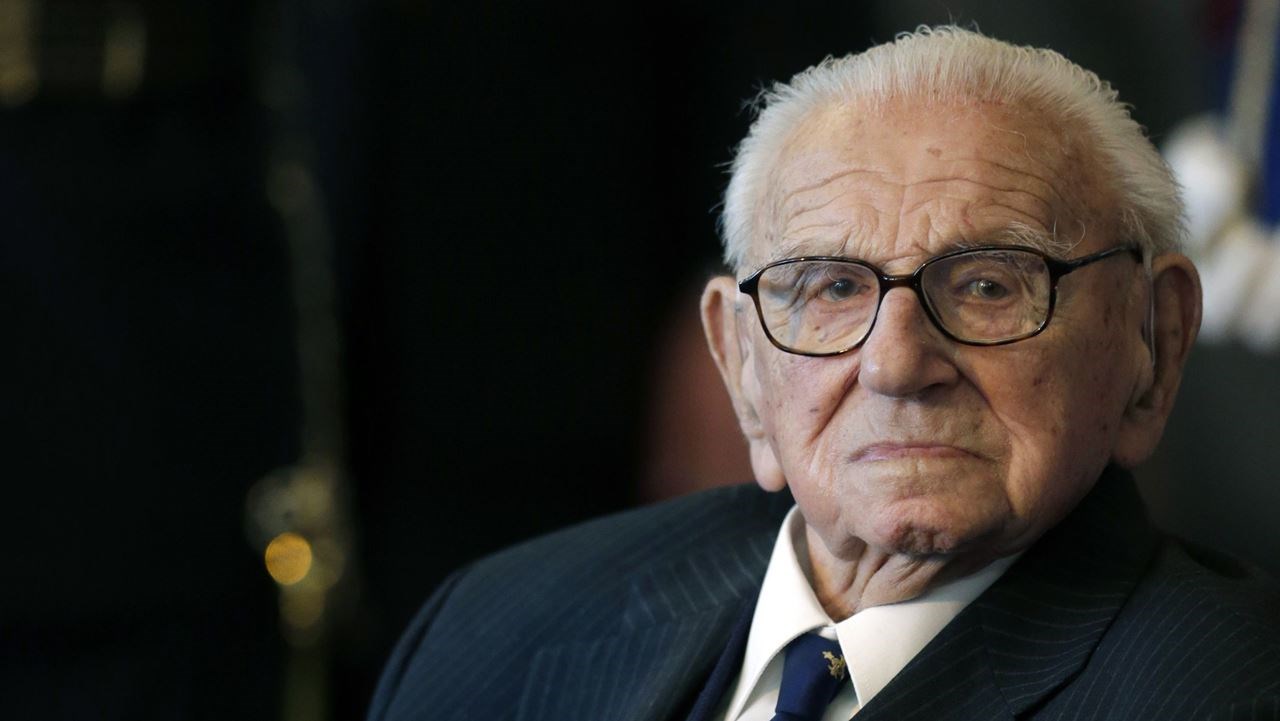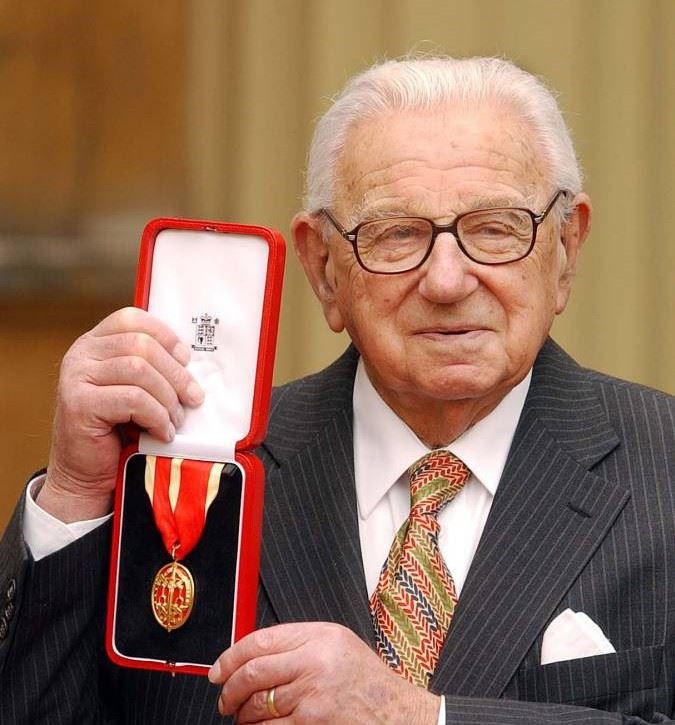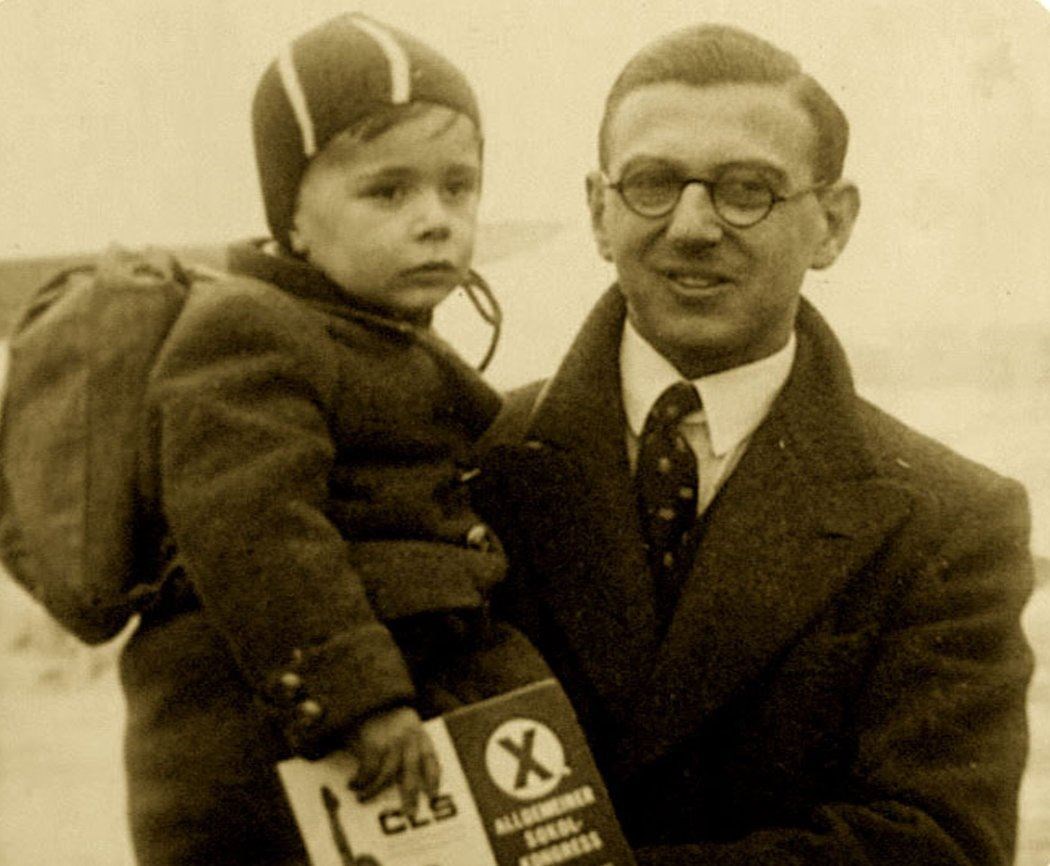 Nicholas Wintonqz.comA cape and symbol is what many people usually invision when they think of a hero. However, this is not particularly true. Instead, a hero can be just any normal person who decides to make a change - no matter how small or big - to positively impact the world around them. A hero is someone who puts the lives of other people ahead of their own and does not think twice about it. A hero is someone like Nicholas Winton, a man who rescued 669 children from Czechoslovakia on the eve of the Second World War. After doing this, Winton then returned to England and worked for Czech refugees over a period of several months in 1939. And then, in the end, he returned to his career of a stockbroker and family life until he passed away on July 1, 2015 in Maidenhead, England at the stunning age of 106. Today, Nicholas Winton is still remembered as a true example of a hero because of his actions that saved so many people’s lives. Nicholas Winton went from being a young English stockbroker to one of the greatest heroes that has lived and because of his humble ways of not seeking attention, praise, and glory as well as his constant need to help others by putting their needs in front of his own, he is a true inspiration.
Nicholas Wintonqz.comA cape and symbol is what many people usually invision when they think of a hero. However, this is not particularly true. Instead, a hero can be just any normal person who decides to make a change - no matter how small or big - to positively impact the world around them. A hero is someone who puts the lives of other people ahead of their own and does not think twice about it. A hero is someone like Nicholas Winton, a man who rescued 669 children from Czechoslovakia on the eve of the Second World War. After doing this, Winton then returned to England and worked for Czech refugees over a period of several months in 1939. And then, in the end, he returned to his career of a stockbroker and family life until he passed away on July 1, 2015 in Maidenhead, England at the stunning age of 106. Today, Nicholas Winton is still remembered as a true example of a hero because of his actions that saved so many people’s lives. Nicholas Winton went from being a young English stockbroker to one of the greatest heroes that has lived and because of his humble ways of not seeking attention, praise, and glory as well as his constant need to help others by putting their needs in front of his own, he is a true inspiration.
 Nicholas Wintonmetro.co.ukNicholas Winton’s humble ways define him as a hero because he never takes the attention and praise he receives and instead stays modest through it all. After the rescue mission Winton’s wife, Grete, uncovered something about his past with the rescue work that she did not know: In 1988 Grete Winton came across a scrapbook in the attic. It contained the names, photos, and other information about hundreds of children. She knew nothing of her husband's rescue work, but when she asked him who these children were, he said very little. Winton shrugged off his accomplishments, and told her to throw the book away. ("Nicholas Winton." Biography in Context) As stated in the details of the passage above, even the close people around him like his family did not even know about the heroic acts he did. It was not until later on that his wife uncovered it by herself. He kept quiet to himself instead of telling the whole world because he did not do it to seek attention. When he “shrugged off his accomplishments, and told her to throw the book away,” it shows just how meaningless attention is to him and how much more significant his acts of kindness are. Winton is defined as a hero because he stays humble no matter how much attention, glory, and praise he could potentially have. And instead, he always stayed modest. This also shows his motives for wanting to do something to actually help the person rather than for fame, attention, and praise from the public and worldwide community. Furthermore, Winton’s daughter, Barbara, wrote a book about Nicholas so she can express to the world how he constantly stayed modest through this episode in his life and stated in it: Thanks to that visit--as well as a memoir written by Winton's daughter, Barbara, If It's Not Impossible, with his cooperation--I have come to understand his reticence. In part, he simply was a private man, bewildered by the attention that was showered upon him and uncomfortable with the idea that a single episode in his life should define who he was. He also didn't think he deserved so much credit when others who worked with him and took far greater risks hadn't lived long enough to see their contributions recognized. (Masters) Winton is humble about his past and the good he has done. He shows how he does not crave attention by even giving credit to the others who helped him make it all possible. He also constantly turns down questions as well by giving off a “shy” character. So, even through all the success, he still remains modest and gives equal credit to everyone he was working with. His main motive is to help people and make an impact and effect on their lives while he ignores the amount of attention and fame he receives. Despite all the attention and praise Winton was receiving, he always stayed true to his way of living. He never gave into the extensive praising the public was giving him, but instead, he always gave credit to his former colleagues who helped him make it possible. Winton believed that one episode in your life does not define who you are, which goes to shows that he does not believe that this amazing act he did was worth all the attention, illustrating his humble manner. Therefore, Winton is considered a hero since he stays humble and modest through it all instead of giving into the amount of fame and worship he was extensively receiving.
Nicholas Wintonmetro.co.ukNicholas Winton’s humble ways define him as a hero because he never takes the attention and praise he receives and instead stays modest through it all. After the rescue mission Winton’s wife, Grete, uncovered something about his past with the rescue work that she did not know: In 1988 Grete Winton came across a scrapbook in the attic. It contained the names, photos, and other information about hundreds of children. She knew nothing of her husband's rescue work, but when she asked him who these children were, he said very little. Winton shrugged off his accomplishments, and told her to throw the book away. ("Nicholas Winton." Biography in Context) As stated in the details of the passage above, even the close people around him like his family did not even know about the heroic acts he did. It was not until later on that his wife uncovered it by herself. He kept quiet to himself instead of telling the whole world because he did not do it to seek attention. When he “shrugged off his accomplishments, and told her to throw the book away,” it shows just how meaningless attention is to him and how much more significant his acts of kindness are. Winton is defined as a hero because he stays humble no matter how much attention, glory, and praise he could potentially have. And instead, he always stayed modest. This also shows his motives for wanting to do something to actually help the person rather than for fame, attention, and praise from the public and worldwide community. Furthermore, Winton’s daughter, Barbara, wrote a book about Nicholas so she can express to the world how he constantly stayed modest through this episode in his life and stated in it: Thanks to that visit--as well as a memoir written by Winton's daughter, Barbara, If It's Not Impossible, with his cooperation--I have come to understand his reticence. In part, he simply was a private man, bewildered by the attention that was showered upon him and uncomfortable with the idea that a single episode in his life should define who he was. He also didn't think he deserved so much credit when others who worked with him and took far greater risks hadn't lived long enough to see their contributions recognized. (Masters) Winton is humble about his past and the good he has done. He shows how he does not crave attention by even giving credit to the others who helped him make it all possible. He also constantly turns down questions as well by giving off a “shy” character. So, even through all the success, he still remains modest and gives equal credit to everyone he was working with. His main motive is to help people and make an impact and effect on their lives while he ignores the amount of attention and fame he receives. Despite all the attention and praise Winton was receiving, he always stayed true to his way of living. He never gave into the extensive praising the public was giving him, but instead, he always gave credit to his former colleagues who helped him make it possible. Winton believed that one episode in your life does not define who you are, which goes to shows that he does not believe that this amazing act he did was worth all the attention, illustrating his humble manner. Therefore, Winton is considered a hero since he stays humble and modest through it all instead of giving into the amount of fame and worship he was extensively receiving.
Nicholas Winton’s constant strive to put others needs and well beings in front of his own illustrates the perfect example of taking risks for a hopeful positive outcome. Winton’s motives to help others such as his rescue of six hundred and sixty-nine children illustrated his true characteristics: In recent years, Nicholas Winton has been widely and publicly praised for his extensive work in ‘rescuing’ 669 children from Czechoslovakia in a Prague-based Kindertransport… Since his public introduction to the individuals he saved, Winton has become well known as the ‘British Schindler’. Winton makes a good hero. He was genuinely modest, unassuming, and repeatedly sought to share his accolades with his former colleagues (Brade E and Holmes).Winton’s actions were all driven by the fact of helping others needs. He rescued six hundred and sixty-nine children, but why? Because he was “genuinely modest, unassuming, and repeatedly sought to share his accolades with his former colleagues” but most importantly selfless. Winton identifies as a true hero because many others would have never taken the risks to help these children and care for the sake of them without having the thought of their own first. Winton’s character trait of being selfless makes him a true hero. Winton as well always seized the opportunity to help others even when he had to give something of his own up: When donations did not meet demand, Winton used his own money. When the British Home Office took too long to process entry visas, he again resorted to forging documents. The war was approaching, and Winton knew the children had very little time ("Nicholas Winton." Biography in Context, Gale). Winton always had the motive to help others. He always put himself in front of others which is why he is considered hero. In the passage, it says that he used his own money, which could have been used for himself but instead he put the needs of others in front of himself. He constantly kept trying to better everyone else's state without even thinking of the danger and risks he was putting himself into, illustrating selflessness as a true hero. Whenever Winton saw the opportunity to help these children he took it without a thought of his own being. He constantly worked hard so he can provide for the need of the children and retreat them to safety, all without thinking about the danger he could have been in. All the risks he has taken have lead the children to safety. Putting others needs and well beings in front of his own is what Nicholas Winton constantly did, he always took risks for the hope of a positive outcome and took any opportunity that would benefit others even if it did not positively impact himself.
 Nicholas Winton - In Actionwww.nytimes.comFrom average person to hero, Nicholas Winton has truly impacted the world through his humble ways of not seeking for attention, praise, and glory and how he always put others in front of himself throughout the journey of rescuing these children. Nicholas Winton emphasized the true idea of a hero when he took the risk of helping 669 Jewish children from Czechoslovakia on the eve of the Second World War. His journey of doing so all later on showed his true colors of a hero. He constantly always denied attention and praise because his main motive was to help others for the better of us humans instead for fame and worship. Besides being humble he also put the needs of others in front of own, even when he was in risk. Despite Winton’s humble ways and selflessness he also had the pursue to motivate and inspire others to do kind acts like his. His legacy was that anyone, no matter how normal, can always have the chance to help someone else and make an impact on their community. He is a true hero because he did not do these impactful things so that he can have all the attention and praise but so that he can help others have an impact such as the one he had. Making more heroes in the world - whether it be through inspiration or giving the opportunity - is the true mark of a hero. And Nicholas Winton is the perfect example.
Nicholas Winton - In Actionwww.nytimes.comFrom average person to hero, Nicholas Winton has truly impacted the world through his humble ways of not seeking for attention, praise, and glory and how he always put others in front of himself throughout the journey of rescuing these children. Nicholas Winton emphasized the true idea of a hero when he took the risk of helping 669 Jewish children from Czechoslovakia on the eve of the Second World War. His journey of doing so all later on showed his true colors of a hero. He constantly always denied attention and praise because his main motive was to help others for the better of us humans instead for fame and worship. Besides being humble he also put the needs of others in front of own, even when he was in risk. Despite Winton’s humble ways and selflessness he also had the pursue to motivate and inspire others to do kind acts like his. His legacy was that anyone, no matter how normal, can always have the chance to help someone else and make an impact on their community. He is a true hero because he did not do these impactful things so that he can have all the attention and praise but so that he can help others have an impact such as the one he had. Making more heroes in the world - whether it be through inspiration or giving the opportunity - is the true mark of a hero. And Nicholas Winton is the perfect example.
Works Cited
Brade, Laura E., and Rose Holmes. "Troublesome Sainthood: Nicholas Winton and the
Contested History of Child Rescue in Prague, 1938-1940." History and Memory: Studies
in Representation of the Past, vol. 29, no. 1, 2017, p. 3+. Student Resources In Context,
https://link.galegroup.com/apps/doc/A493032588/SUIC?u=powa9245&sid=SUIC&xid=b57d2f9b. Accessed 26 Mar. 2018.
Masters, Kim. "The man who saved mom from the Holocaust." Hollywood Reporter, 24 July
2015, p. 62+. Biography in Context,
https://link.galegroup.com/apps/doc/A422902474/BIC1?u=powa9245&xid=68324089.
Accessed 24 Mar. 2018.
"Nicholas Winton." Gale Biography in Context, Gale, 2015. Biography in Context,
https://link.galegroup.com/apps/doc/K1650009835/BIC1?u=powa9245&xid=0f0cc9c8.
Accessed 23 Mar. 2018.
Page created on 4/18/2018 6:08:53 PM
Last edited 4/18/2018 6:35:20 PM
